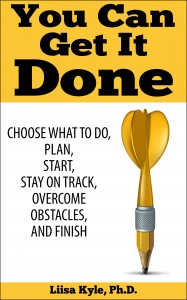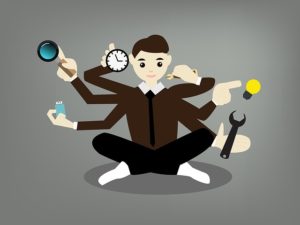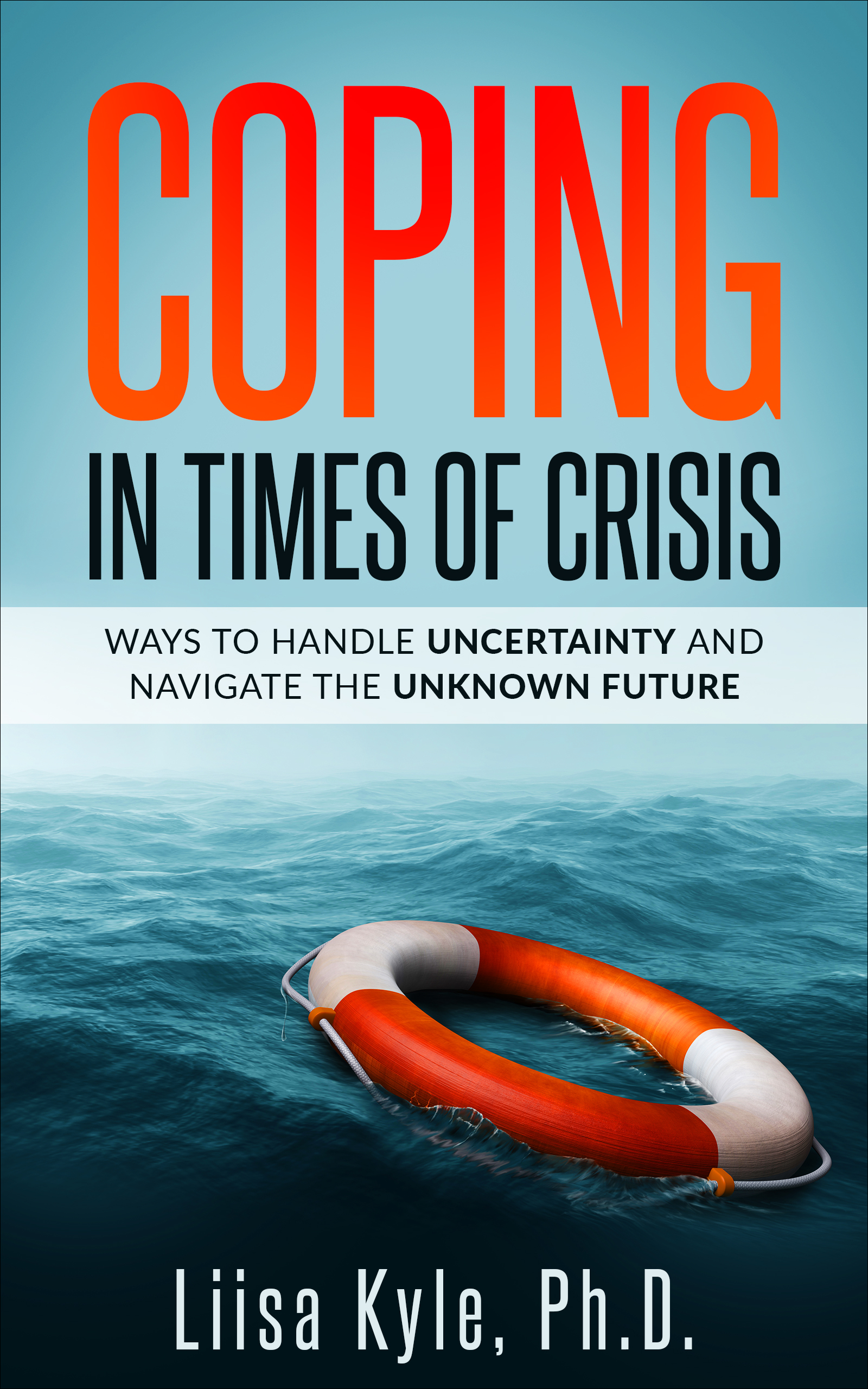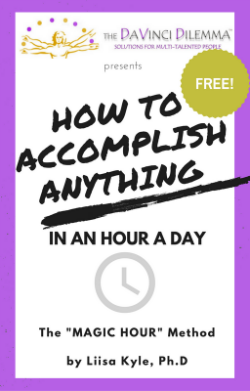There is a lot of pressure in our society to multi-task. We are encouraged to be superhumans simultaneously juggling work, homelife, and social activities with deft aplomb. It can feel good. It can be gratifying to be jumping around among different activities. (Look at everything I’m doing! Look what a capable, competent person I am!) There are two problems with this. First, we’re not *really* multi-tasking. Second, whenever we attempt to multi-task, we get less done, and we do it less well.
Myth #1: We are NOT really multi-tasking.
At a given instant, a person can only do one thing.
“Oh no, not me,” you may balk. “I’m a multi-tasker. Right now, while I’m reading this, I’m also listening to music, keeping tabs on my Twitter feed, and texting my mom.”
No, you’re not. Research as proven that humans can do only one thing at a time. Our brains can process only one thing at a time. When you believe you are simultaneously, reading, listening, tweeting, and texting you’re brain is actually repeatedly switching attention between “reading” and “listening” and “tweeting” and “texting”.
Okay, big deal — it’s just semantics, right? Maybe we’re technically not doing everything simultaneously but it’s all getting done. We’re switching attention among all our activities pretty darned fast.
Yes, we can toggle among different tasks within seconds — but whenever we do there is a cost.
Myth #2: When we attempt to multi-task, we get less done and we do it less well.
Whenever we switch from one task to another, we lose. We lose time. We lose cognitive processing. The more we switch between tasks, the more we lose. Research by Professor Dave Meyers and others has shown that “shifting between tasks can cost as much as 40 percent of someone’s productive time.” FORTY PERCENT! That’s a lot. For those of your multi-taskers complaining that “there aren’t enough hours in the day“, there would be 40% more if you would cease multi-tasking and focus on only one thing at a time.
Yet multi-taskers believe they are being productive when they are NOT. Multi-taskers are bad at filtering irrelevant information from relevant. They have diminished powers of mental organization and have extra difficulty switching between tasks.
Stanford professor Clifford Nass explained in a recent NPR interview: “We have scales that allow us to divide up people into people who multitask all the time and people who rarely do, and the differences are remarkable. People who multitask all the time can’t filter out irrelevancy. They can’t manage a working memory. They’re chronically distracted. They initiate much larger parts of their brain that are irrelevant to the task at hand. And even – they’re even terrible at multitasking. When we ask them to multitask, they’re actually worse at it. So they’re pretty much mental wrecks.”
Worse, Nass found that the multi-taskers develop such strong patterns of scattered focus that they lose the ability to concentrate on one thing. By multi-tasking, people are basically training themselves to be disorganized, unproductive, scattered and ineffectual.
One of the biggest contributor to rampant multi-tasking is technology. Our phones, tablets and computers directly deliver us personalized distractions in the form of social media alerts, phone calls, texts, music, and emails. There are many costs to this constant bombardment of information but perhaps the most damaging is that is steals our focus. It may not be urgent. It may not be important. But whatever it is — a tweet, an email, a song, a text — it is NEW, it’s been delivered to us, and it hijacks our attention.
This can be especially disastrous for DaVincis — multi-talented people juggling too many ideas and projects — because when new information comes to us, it tends to take us away from the task at hand. It can remind us of something we need to do. It can generate a bevy of new ideas. It can cause us to take a moment to check something online…and before we know it, it’s two hours later and we’re ordering new cookware, which had nothing to do with the original tweet but…squirrel!…one idea led to another led to another and now we’ve lost the morning with little to show for it other than deeper credit card debt.
Odds are high that your phone is ‘on’ right now — awaiting calls, texts, tweets and emails. It will buzz or ding to make you aware of every single possible incoming message. You may be listening to music — which can prompt memories, emotions, and yet more new ideas. If your computer browser is like mine, each tab denotes the number of unread messages you’re missing. Right this moment, it is taking every fibre of my being to continue writing and to *not* stop to check the seven emails in my inbox or the eight Facebook notifications. Oh! And there goes my phone. Someone’s texting me. It’s probably not urgent but shouldn’t I take a quick peek to make sure?
No! Not if I want to get things done. Research proves that people get more done when they do only one thing at a time. To the extent that we can defer all the distractions, the more we accomplish, with less stress, and the better quality it is.
Still don’t believe it? Here are some articles on the research supporting the fact that focus is better than multi-tasking for getting things done.
Switching Costs of Multi-Tasking
Multi-Tasking Impact on Creativity
***
 Want more tips and techniques on getting things done? Check out my book YOU CAN GET IT DONE: Choose What to do, Plan, Start, Stay on Track, Overcome Obstacles, and Finish
Want more tips and techniques on getting things done? Check out my book YOU CAN GET IT DONE: Choose What to do, Plan, Start, Stay on Track, Overcome Obstacles, and Finish
Available here for only $3.99: http://bit.ly/YouCanGetItDone
***
Want to re-publish this article? Go for it – just include the author’s name, a link to this original post and the following text blurb:
Are you struggling with too many talents, skills, ideas? You may have The DaVinci Dilemma™! Find tools, fun quizzes, coaching, inspiration and solutions for multi-talented people at http://www.davincidilemma.com/ .




